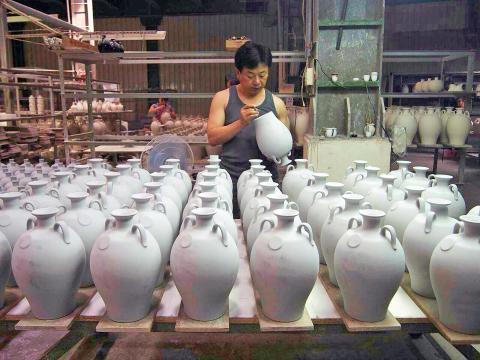The number of “factories” that promote history and culture through tourism in the nation has ballooned to 117 this year from 14 in 2008, according to the Industrial Technology Research Institute, which added that the number of “tourism factories” has grown sevenfold in as many years.
Factories focusing on alcoholic drinks and food top the list at 40, with King Car Group’s Kavalan Whiskey Factory in Yilan County and the Kuo Yan-ye Museum of Cake and Pastry in Taoyuan County being notable examples.
Factories focusing on commodities came in second at 28, such as the Hsing Lung Towel Factory in Yunlin County, Les Enphant’s museum in Taoyuan County and the Taiwan Metal Creative Museum in Greater Tainan.

Photo: Lai Hsiao-tung, Taipei Times
Nineteen factories specialize in healthcare, such as the Brand’s Health Museum in Changhua County, while 17 factories specialize in the humanities, such as Chang Lien-chang’s Saxophone Museum in Greater Taichung.
There are 13 factories focusing on oils, salt and rice, with Tatung’s Soy Sauce Brewing Museum and the Zhong Xin Rice Castle in Changhua being notable examples.
In terms of geographical location, Greater Tainan leads the list with 19 factories, New Taipei City is second with 16 and Taoyuan County is third with 12 factories.
Department of Innovative Industrial Clustering Director Tsai Hsiu-ju (蔡秀如) said on Monday that the latest tourism factory to be approved was the Homestretch Hydrogel Tourism Factory in Greater Tainan’s Rende District (仁德).
“The factory is the first in the nation to be based on hydrogel, and it has been established so that Taiwanese can better understand medical-grade hydrogel and its functions,” she said.
Tourism factories are miniature reflections of their respective industries, Tsai added.
The assessment of tourism factories is based on five main factors — the type of business, their size, tourism facilities, the level of service and management capabilities, the institute said.
In a drive to facilitate the transition from a manufacturing to a service-based economy, the Ministry of Economic Affairs has encouraged traditional factories to incorporate tourism.
Since 2003, 160 factories have applied for the ministry to assess and aid them in their transition, with 117 passing the assessment.
The rising popularity of tourism factories and number of factories willing to make the transition may be increasing due to there being more emphasis placed on leisure time, the institute said.
Tsai said that tourism factories have become common for weekend excursions and school tours, adding that the volume of tourists during the summer vacation has greatly increased.

Beijing could eventually see a full amphibious invasion of Taiwan as the only "prudent" way to bring about unification, the US Department of Defense said in a newly released annual report to Congress. The Pentagon's "Annual Report to Congress: Military and Security Developments Involving the People's Republic of China 2025," was in many ways similar to last year’s report but reorganized the analysis of the options China has to take over Taiwan. Generally, according to the report, Chinese leaders view the People's Liberation Army's (PLA) capabilities for a Taiwan campaign as improving, but they remain uncertain about its readiness to successfully seize

Taiwan is getting a day off on Christmas for the first time in 25 years. The change comes after opposition parties passed a law earlier this year to add or restore five public holidays, including Constitution Day, which falls on today, Dec. 25. The day marks the 1947 adoption of the constitution of the Republic of China, as the government in Taipei is formally known. Back then the Chinese Nationalist Party (KMT) governed China from Nanjing. When the KMT, now an opposition party in Taiwan, passed the legislation on holidays, it said that they would help “commemorate the history of national development.” That

Trips for more than 100,000 international and domestic air travelers could be disrupted as China launches a military exercise around Taiwan today, Taiwan’s Civil Aviation Administration (CAA) said yesterday. The exercise could affect nearly 900 flights scheduled to enter the Taipei Flight Information Region (FIR) during the exercise window, it added. A notice issued by the Chinese Civil Aviation Administration showed there would be seven temporary zones around the Taiwan Strait which would be used for live-fire exercises, lasting from 8am to 6pm today. All aircraft are prohibited from entering during exercise, it says. Taipei FIR has 14 international air routes and

The Ministry of National Defense (MND) today released images of the military tracking China’s People's Liberation Army (PLA) movements during the latest round of Chinese drills around Taiwan. The PLA began "Justice Mission 2025" drills today, carrying out live-fire drills, simulated strikes on land and maritime targets, and exercises to blockade the nation's main ports. The exercises are to continue tomorrow, with the PLA announcing sea and air space restrictions for five zones around Taiwan for 10 hours starting from 8:30am. The ministry today released images showing a Chinese J-16 fighter jet tracked by a F-16V Block 20 jet and the